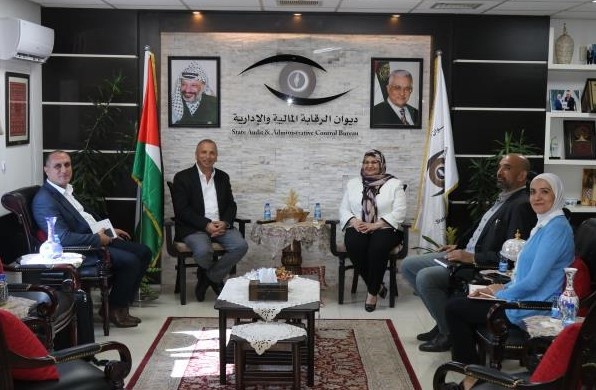
Ramallah – Ma’an – As part of efforts to strengthen the transparency and accountability of Palestinian public sector institutions, the Vigilance Bureau has become one of the fundamental pillars of the national integrity system and is considered the highest oversight body in Palestine. It is being The Supervisory Department ensures the correct implementation of laws and institutions and contributes to uncovering deviations, whether financial or administrative, that may affect the performance of the government.
In this report, we focus on the most prominent operational axes adopted by the Department and discuss with those responsible for this oversight to develop strategies and goals to improve the agency’s performance.
Financial and administrative oversight: Strengthening transparency and accountability in Palestine
In an interview with Ma’an, Rana al-Assi, head of communications at the Department of Finance and Administration, said the department is considered the highest regulatory body in Palestine and enjoys legal status and financial and administrative independence. said. He noted that the agency has a special budget within the general budget of the Palestinian state, which reflects its independence in carrying out its duties. Al Assi added that the Audit Bureau is an important pillar of the national integrity system as it contributes to improving government performance and increasing transparency and accountability of various government institutions.
Mr. Al-Assi said that the bureau is responsible for providing expert advice on public resources and services, with the aim of ensuring the integrity of the public affairs of entities supervised by the bureau and submitting accurate professional reports to parliament. He explained that he continues to work towards the fight against corruption by providing quality supervisory services. This increases the effectiveness of domestic supervisory work.
Strengthen community partnerships and deepen the culture of community oversight
In a separate context, Mr. Al Assi confirmed that he seeks to build professional relationships with all parties with the aim of increasing understanding of the importance of supervisory work. He explained that this cooperation will contribute to strengthening the role of the Secretariat, widening the base of awareness of the principles of good governance, and encouraging a culture of reporting violations and providing accurate information.
Al-Assi said: “We strive to instruct the relevant authorities to submit audit requests and complaints within the scope of the Department’s work, and the authorities are also working hard to increase confidence in our work.” We believe that we will be an indispensable partner.” It added that the Secretariat operates in accordance with INTOSAI international standards and aims to bring about real change in the lives of Palestinians by monitoring and improving the services provided to them. He also said the department will use social media to promote a culture of community oversight through publications aimed at deepening the public’s understanding of the department’s role and increasing confidence in its professional reporting. He pointed out that
For more information about the Audit Bureau, please visit its official website.
https://www.saacb.ps/ar/IndexAr.aspx
Audit Office: an essential supervisory role in increasing transparency
In this context, Mr. A said: Youssef Hantash, head of the planning and development department at the Audit Department, told Ma’an, “The Audit Department is the highest regulatory body in Palestine and one of the important constitutional institutions.” is an external auditor of a public institution.” “Sectoral institutions” under Article 96 of the Basic Law as amended in 2003.
In addition to uncovering financial or administrative deviations that may affect government performance, the bureau is critical to ensuring transparency in government operations provided by public sector institutions, Hantas said. He added that the department is working to ensure that government activities are carried out. Comply with applicable regulations and laws. This increases the government’s credibility with the people.
Commenting on the Audit Department’s strategy, Mr. Hantas said that the Audit Department will focus on the Sustainable Development Goals, especially in key areas that have a direct impact on society, as well as on auditing the performance of its duties, to ensure that its various services are optimized to the best of its ability. He explained that he is following a clear strategy to provide the public with the following methods: He added that the focus is on providing quality services to the people, focusing on the people’s lives, such as the education and health sectors.
More details in the next interview
https://www.facebook.com/watch/?v=1610610072868650&rdid=D1I7Yv8HVIiPNBkk
Supervisory executive development training project
Regarding the development of supervisory cadres, Ismat Abu Rabi, Director of Finance and Administration at the Audit Department, said in Haditha to Ma’an that the Audit Department has developed a training project in cooperation with the United Nations Development Program (UNDP) and He explained that he had achieved his goal. Improving the efficiency of internal monitoring departments of various agencies and ministries.
Abu Rabih said: “This project includes a wide range of activities, starting from auditing and financial compliance, to performance monitoring training and report generation focused on improving the services provided to the public during the planning and implementation stages. It includes three stages of practical training.”
In an interview with Ma’an, Abu Rabih said that the second phase of the project will be expanded to include training in the field of information technology and audit automation, while the third phase will include new components aimed at linking with internal controls. Said it was added. Each department will work with the Audit Bureau to exchange experiences and strengthen interdepartmental cooperation.
More details in the next interview
https://www.facebook.com/watch/?v=1078677507075368&rdid=Ikq8z3LBcFxfHha9
Internal control: ensuring the effectiveness of government performance
Regarding the department’s role and its operations, Abdullah Al Ali, Head of the Internal Control Department of the Audit Department, told Ma’an that the department plays an important role in financial auditing and administrative compliance in all aspects of related institutions. He said he is fulfilling his role. To provide services to the people. Al Ali said, “The internal control department is considered a safety valve for management because it helps in making the right decisions by monitoring the organization’s performance in administrative and financial terms. ”, he said, adding that this sector plays an important role. Improve the quality of government services by monitoring tenders and activities that directly impact the public.
Mr. Al Ali said that the training project launched by the Audit Department aims to provide employees with the necessary skills to improve the quality of their performance, and that it is working with relevant ministries to determine priority training themes. It was pointed out that contact had been made. He further stated: “A committee of senior auditors and managers was established to select the training materials to be provided, focusing on topics related to procurement systems, financial and administrative systems, and civil service services.
More details in the next interview.
https://www.facebook.com/watch/?v=1719249485532531&rdid=7pqgqMEmutmIPv9T
Internal Oversight Department Training Program: Strategic Partnership with the United Nations Program
Within the framework of strengthening the capacity of government institutions to achieve transparency and accountability, the Audit Office, in cooperation with the United Nations Development Program (UNDP), has developed a A training program was implemented. The program consisted of several stages and was aimed at increasing the effectiveness of internal controls and achieving the highest level of efficiency in government operations.
“The Audit Office is strengthening its IT audit capacity with funding from the United Nations.”
As part of the Palestinian Authority’s continued efforts to keep pace with digital transformation and technological developments, the Department of Finance and Administrative Audit has received government funding to develop the capacity of the Department in the field of Information Technology Audit ( IT audit) project was launched. United Nations Development Program (UNDP). This project reflects the Department’s commitment to improving supervisory performance to ensure the best government service delivery and achieve the highest standards of transparency and accountability in the public sector.
In this context, the Audit Department will benefit from financial support from the United Nations Development Programme, in 2024, to improve the skills of the Audit Department executives in the field of information technology auditing and integrate it with financial oversight. Specialized training was conducted for 12 trainees. . In addition to becoming familiar with important standards and applications such as (ITAF-Work Frame), (COBIT-Work Frame), (ISO27001), we also train trainees to obtain a CISA certificate certified by ISACA. emphasis was placed on
Rima Odeh, Information Technology Auditor at the Bureau of Finance and Administration, told Maa: “The purpose of this training is to ensure that the actions of the organizations being audited are consistent with the information technology objectives.” “This will improve the quality of government services.” The project contributed to the publication of a comprehensive audit report on a number of agencies, including the Department of Transport and Communications, the Northern Electricity Company (NEDCO), and government investments in the information technology sector. Based on the developed practical audit guide. ”
Odeh added that the collaboration with UNDP will strengthen the department’s ability to apply the latest international standards and methodologies in IT audits, contributing to improved government performance and efficiency in revenue collection.
Targeting ministries and public institutions

The first phase of the program targeted 19 ministries and public institutions to participate in the training, and these institutions were invited to contribute to building supervisory capacity. In this regard, Mr. Samar Dwaikat, Head of Training Department, Audit Department, told Mr. Maan: The goal of this step was to design a training program that met these needs and realized greater potential benefits for participants. ”
Mr. Dweikat explained that this approach will help customize the content of the program and more precisely guide internal control employees toward improved performance levels.
Designing training programs: meeting needs and achieving benefits
After studying the needs of relevant ministries and agencies, the training program was designed to include a range of topics that keep pace with modern developments in the field of surveillance. Mr. Dwickatt said: “This program includes multiple topics in the field of supervision and management auditing and is designed to meet the aspirations of the participants and improve the ability of internal control departments to perform their tasks more efficiently. “We are strengthening it,” he said.
Monitor performance and improve government services
One of the key topics focused on during the training was “Performance Monitoring”, which is about how to monitor the activities of ministries and public institutions, especially those that provide direct services to the population. Dweikat said, “During the exercise, we focused on improving the monitoring mechanisms of activities that provide critical services to the population and ensuring that these services are delivered with high quality and more effectively. ” he said.
As Dweikat explained in an interview with Maan, the training program included several basic topics aimed at improving the skills of internal control departments in ministries and public institutions. The training began with an introduction to information technology auditing. Key areas for ensuring the efficiency of government information systems were also discussed, highlighting the role of internal control departments in performing various management tasks.
It also focuses on monitoring the activities of ministries through performance monitoring, contributing to improving the efficiency of service delivery to the public. In addition, the risk-based audit method was reviewed, which is considered a modern and effective way to identify and analyze risks related to government activities.
The training also covered audit plan development and taught participants how to design effective audit plans that meet the needs of their institutions. Fraud audits, expenditure and revenue audits were also highlighted as part of the process to ensure that organizations adhere to sound financial standards.
The training did not ignore procurement and management audits, which are important areas to ensure transparency and accountability in the management of public resources. Finally, we worked on monitoring reports and making recommendations, strengthening participants’ ability to document audit findings and provide actionable suggestions to improve government performance.
Training objective: Improve services and increase government efficiency
“The purpose of the training conducted by the Supervisory Department is to increase the capacity of the internal control department in order to improve the quality of government services provided,” Dweikat said, adding: . This is because internal control departments manage and monitor government operations and play a vital role in improving the quality of services provided to the public. ”
He said that these trainings are aimed at improving the performance level of supervisory department employees, which will be positively reflected in the daily life of the public and become a model institution for other government agencies to imitate. He pointed out that this vision can be achieved.
Future vision: Audit Bureau as a model institution
At the end of his speech, Mr. Dweikat emphasized that this training program falls within the framework of the Audit Department’s vision to become a model for Palestinian Authority institutions, saying: “Through these trainings, we will raise the level of government performance and we at the Audit Office recognize that the internal oversight function is a fundamental building block for strengthening integrity and accountability. , we strive to ensure that these programs make a significant contribution to improving the lives of the Palestinian people.”
In conclusion, the role of the Audit Office in Palestine is a fundamental pillar to ensure the transparency and integrity of government work through its monitoring and training role through continuous development and training at the highest levels. . The Office of the Auditor General remains at the forefront of institutions that help ensure people’s rights and foster confidence in the work of government.





